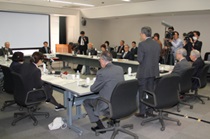- News
“Stakeholder Committee on Usage of A-bomb Survivors’ Biosamples” holds first meeting (Friday May 11, 2018 / Hiroshima University School of Medicine, “Kojin Kaikan”)

RERF Chairman Ohtsura Niwa opens Committee meeting with remarks
The Stakeholder Committee on Usage of A-bomb Survivors’ Biosamples recently held its first meeting to discuss the broader use in advanced research to be conducted by the Radiation Effects Research Foundation of biosamples (including blood components and urine) from A-bomb survivors stored at RERF. The advisory committee was designed to provide a forum for the airing of opinions from the public about RERF’s research and other work.
RERF conducts crucial research on radiation health effects in the atomic bomb survivors, and the organization therefore needs to consider the public’s viewpoint even more than is necessary in typical medical research. This idea was the impetus for the committee’s establishment.
During the meeting, it was explained in what kinds of research the blood, urine, and other biosamples from the A-bomb survivors stored at RERF are to be used. The meeting’s discussions also touched on the tremendous progress made in medical research and how RERF could not possibly possess all relevant technology. In the future, therefore, it will be necessary for RERF to pursue collaborative research with other research organizations, both domestic and international. Committee members expressed opinions from their own unique perspectives: one expressed her critical view of ABCC, but most encouraged RERF’s effective use of the stored biosamples.
RERF is aware that one crucial task is the issue of “How to pay back our research results to the A-bomb survivors.” A recent worldwide trend involves study participants and scientific institutes working together to advance research. RERF also hopes to ultimately work on research cooperatively with A-bomb survivors. Such a partnership would contribute to the elucidation of cancer and other disease mechanisms in collaboration with A-bomb survivors and their children, a result in which everyone could take great pride. It is our strong ambition to successfully achieve this research aim.
